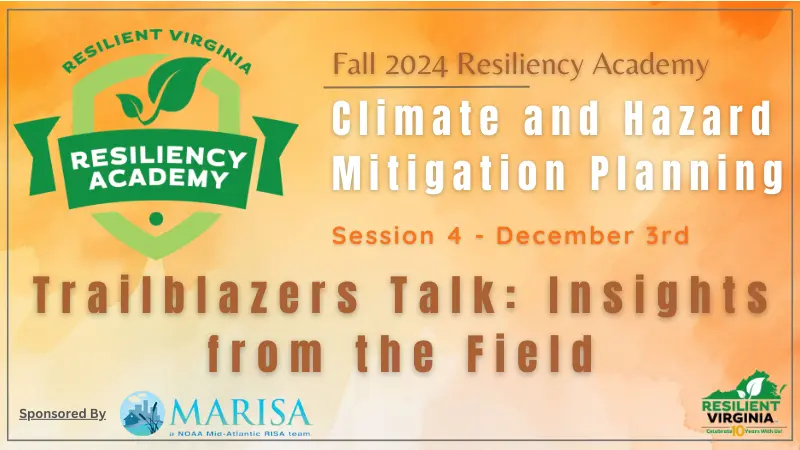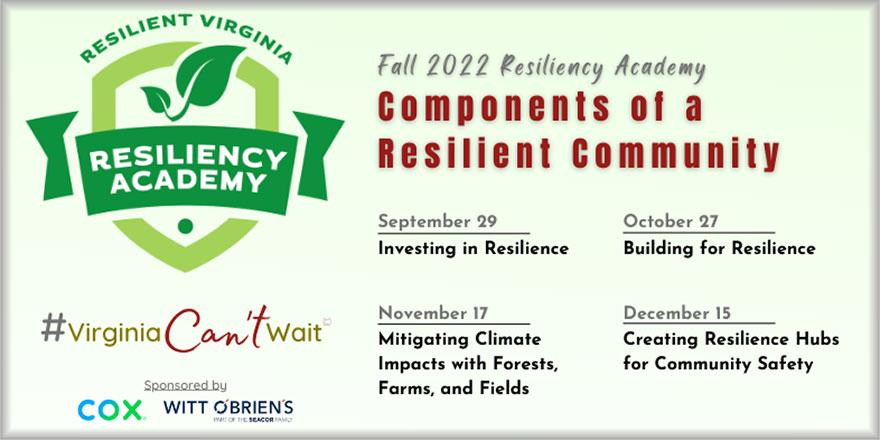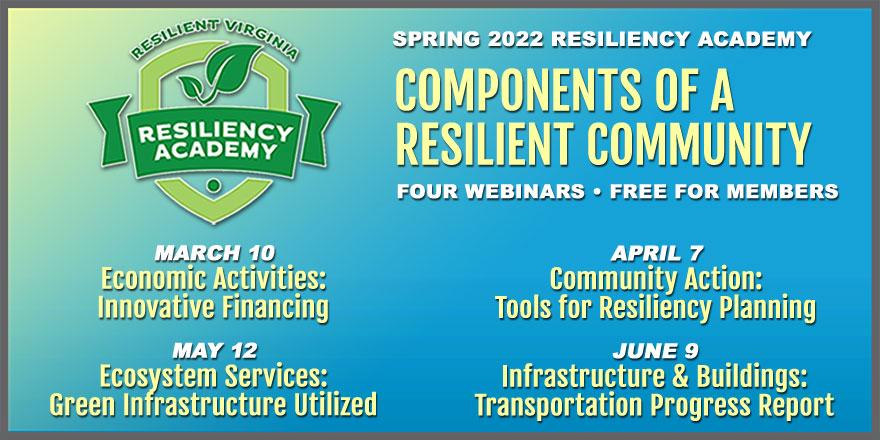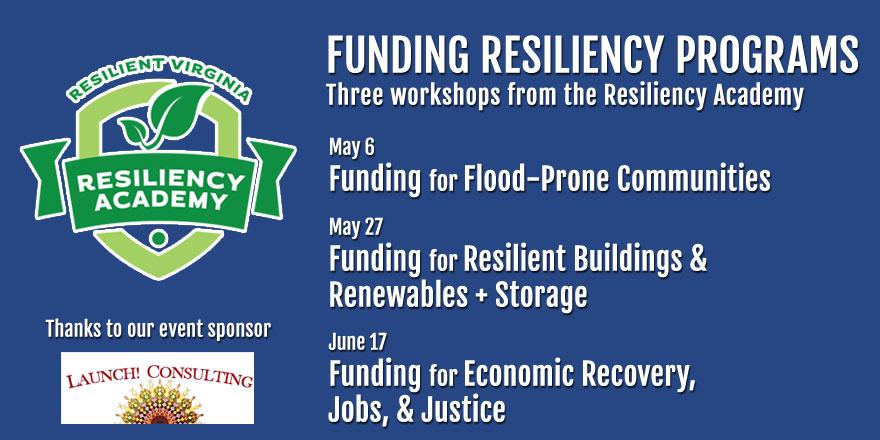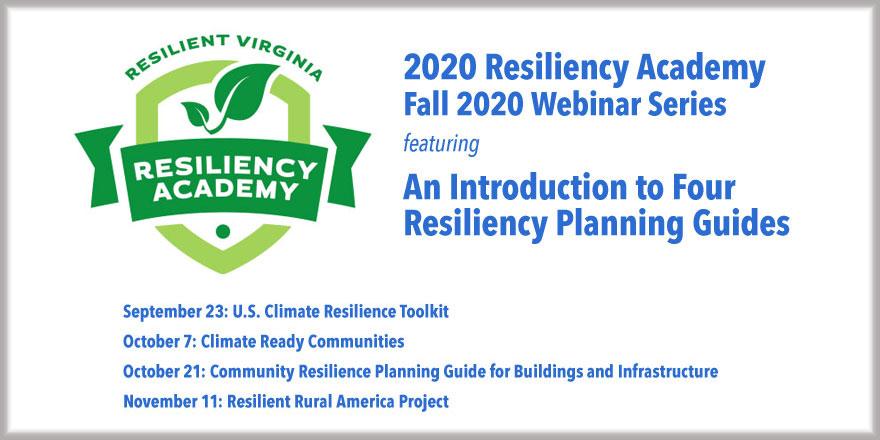Resilient Virginia’s Resiliency Academy series was established in 2020 and continues to deliver timely and relevant resiliency topics via webinars. Past topics include resiliency planning “how-to’s” for local governments; disaster mitigation funding; economic impact and opportunities; resilient building and infrastructure design; and the role of ecosystems in community resilience.
Members have access to our entire video library of Academies, along with presentations and video from our past Conferences. Click here for a full list of membership benefits.
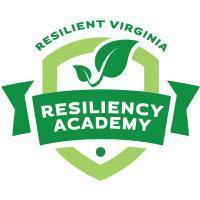
Fall 2024 Resiliency Academy Session 4
Trailblazers Talk:
Insights from the Field
We completed our 2024 Resiliency Academy with a round-table conversation on local and regional governments’ experience in including climate in their Hazard Mitigation Plan updates and how they are implementing resilience mitigation actions in their locality.
View recordings and browse webinar resources below.
Speakers
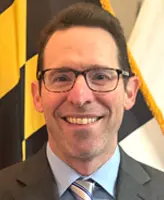
David Mandell
Deputy Director
City of Annapolis Office of Emergency Management
Dave Mandell has served as the Deputy Director of the City of Annapolis Office of Emergency Management since 2014. He graduated from Washington University in St. Louis and also received a Juris Doctor degree from the University of Maryland School of Law. He earned the Certified Emergency Manager designation in 2019. Dave is responsible for all emergency management program areas, including response, planning, grants management, training and education, and public outreach. He manages the City of Annapolis Hazard Mitigation Plan, which was updated most recently in 2023 under the new FEMA guidance. Dave has a passion for bringing major mitigation projects to fruition. He has coordinated efforts that have secured about $9.7 million in mitigation grant funds for Annapolis.
The 2024 Resiliency Academy is offered free of charge
thanks to funding from MARISA.

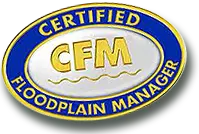
Attention APA Planners
The September 5 session of the Resiliency Academy has been approved by the Virginia Chapter of the APA for 1 CM. Use Code 9295780.
Attention Certified Floodplain Managers
Each 2024 Resiliency Academy session has been approved by ASFM for 1 CEC. If you attend any of the sessions, please let us know and we will send you a proof of attendance to submit for your credit.
Previous Fall 2024 Academy Events
The Latest on Climate in the Mid-Atlantic
September 5, 2024
The Fall 2024 Resiliency Academy kicked off with a look at current and projected climate risks for the Mid-Atlantic region.
As our climate is changing, we are experiencing more extreme events, such as heat waves and storms, which are impacting the way our communities need to plan. The first session of the Fall Resiliency Academy discussed climate risks for the Mid-Atlantic region, including a high-level overall view of risks and a closer look at risks from extreme precipitation and heat. We also take a look at how extreme events are impacting the coast.
Watch the webinar or view the Event Slideshow.
Speaker Resources
Fifth National Climate Assessment – Southeast Chapter
Fifth National Climate Assessment – Northeast Chapter
Fifth National Climate Assessment – Climate Trends
Climate and Hazard Mitigation Planning (CHaMP) Tool
Virginia Coastal Resilience Master Plan
Future Sea Level and Recurrent Flooding Risk for Coastal Virginia
Billion-Dollar Weather and Climate Disasters
Resilience Analysis and Planning Tool (RAPT)
Climate Mapping for Resilience and Adaptation (CMRA)

Jeremy Hoffman
Director of Climate Justice and Impact
Groundwork US
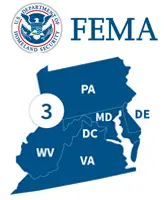
Rodney Bahner
Community Planner
FEMA Region 3

Art DeGaetano
Professor of Earth and Atmospheric Sciences
Cornell University

Jessica Whitehead
Institute for Coastal Adaptation and Resilience
Old Dominion University
FEMA Regulations: Requirements and Benefits
October 8, 2024
Session 2 of our Fall Resliency Academy explores how to integrate climate in your planning efforts and the benefits it will bring.
Knowing what climate changes our communities are likely to experience and integrating them into their planning efforts can help localities properly plan for the future. But that’s not the only benefit of integrating climate into planning efforts. It also opens up funding opportunities that can help communities implement actions to achieve their resilience goals.
Watch the webinar or view the Event Slideshow.
Speaker Resources
Building Resilient Infrastructure and Communities (BRIC)
Flood Mitigation Assistance (FMA) Grant Program
Hazard Mitigation Grant Program (HMGP)
Rehabilitation of High Hazard Potential Dams (HHPD)
Fire Management Assistance Grants (FMAG)
Local Mitigation Planning Policy Guide
Local Mitigation Planning Handbook
Climate Adaptation Planning: Guidance for Emergency Managers
Resilience Analysis and Planning Tool (RAPT)
Climate Risk + Resilience Portal (ClimRR)
Climate Mapping for Resilience and Adaptation (CMRA)
FEMA Resources for Climate Resilience
Building Alliances for Climate Action
Long-Term Community Resilience Exercise Resource Guide
FEMA Region 3: Local Hazard Mitigation Planning Resources
Fifth National Climate Assessment
Guidelines for Considering Traditional Knowledge in Climate Change Initiatives
Equity and Mitigation Planning
Climate and Economic Justice Screening Tool
Promoting Nature-Based Hazard Mitigation Through FEMA Mitigation Grants
US EPA Disaster Resilient Design Concepts
HUD Climate Resilience Implementation Guide: Nature-based Solutions
National Centers for Environmental Information
U.S. Climate Resilience Toolkit
Equitable Adaptation Legal & Policy Toolkit
Managing the Retreat from Rising Seas: Lessons and Tools from 17 Case Studies
Climate Change and Displacement in U.S. Communities
Climate Change in Coastal Communities
Sign up for FEMA Region 3 Email Updates

Jeramie Calandro
Emergency Management Specialist
FEMA

Rodney Bahner
Community Planner
FEMA Region 3

Katie Vugdalic
State Hazard Mitigation Officer
Virginia DEQ
Hazard Mitigation Tools: Saving Lives, Building Resilience
November 12, 2024
Our November 12 event focused on where to find data for Hazard Mitigation Plans and how you can include social vulnerability in your planning process.
Watch the webinar or view the Event Slideshow.
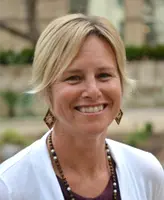
Baja
Originator of the Resilience Hub Concept
Developer, New and Improved All Hazard Mitigation Plan

Melissa Finucane
Vice President of Science & Innovation
Union of Concerned Scientists
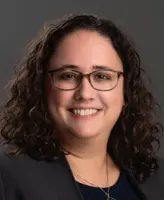
Krista Romita Grocholski
Physical Scientist, RAND Corporation
Lead Principal Investigator, Mid-Atlantic Climate Adaptation Program (MARISA)
Trailblazers Talk: Insights from the Field
December 3, 2024
We wrap up this year-long series with a round-table conversation on local and regional governments’ experience in including climate in their Hazard Mitigation Plan updates and how they are implementing resilience mitigation actions in their locality.
We have a great panel of speakers who share their experiences with hazard mitigation planning and resilience implementation efforts.
Watch the webinar or view the Event Slideshow.

David Mandell
Deputy Director
City of Annapolis Office of Emergency Management

Sarah Stewart
REME Planning Director
PlanRVA
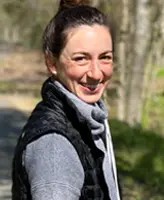
Jenn Clarke
Program and Operations Supervisor
City of Richmond's Stormwater Utility

Matt Lewis
Operations Support Coordinator
Botetourt County Department of Community Development

Lindsey Adams
Climate Resiliency Engineer
Weston & Sampson

Erin Herock
Resilience Planner
Weston & Sampson
Spring 2024 Academy Events
Understanding Climate in Virginia
March 26, 2024
Get acquainted with future climate projections for Virginia in the first session of the Spring 2024 Resiliency Academy. Jeremy Hoffman, Director of Climate Justice and Impact at Groundwork USA and lead author of the Southeast Chapter of the 5th National Climate Assessment, presents a summary of the most recent projections for this region and additional speakers discuss how the changing climate will impact their communities.
Attendees will leave with a better understanding of how communities across Virginia are going to be impacted by climate change and what they will need to consider in their planning efforts.
Watch the webinar or view the Event Slideshow.

Jeremy Hoffman
Director of Climate Justice and Impact
Groundwork US

Jessica Whitehead
Institute for Coastal Adaptation and Resilience
Old Dominion University

Brent Wills
Wills Soil & Stream
Montvale, Virginia
Integrating Climate in Hazard Mitigation Planning
May 2, 2024
Hear from Virginia Department of Emergency Management (VDEM) and Federal Emergency Management Agency (FEMA) on the new requirements for Hazard Mitigation Plans and available resources. In addition, you’ll hear directly from some who have already updated Hazard Mitigation Plans according to the new guidelines.
Gain a better understanding of what is now required when updating Hazard Mitigation Plans and what resources are available.
Watch the webinar or view the Event Slideshow.

Rodney Bahner
Community Planner
FEMA Region 3

Dave Mandell
Deputy Director
City of Annapolis Office of Emergency Management

Debbie Messmer
Deputy Director of Grant Management and Recovery
Virginia Department of Emergency Management

Anna Kimelblatt, CFM,
Project Planner and Certified Floodplain Manager
Weston & Sampson Engineers

Janet Moonan, PE
Senior Project Manager
Weston & Sampson Engineers
Tools for Climate and Hazard Mitigation Planning
May 26, 2024
In this session we discuss tools from MARISA, DCR, FEMA, and USDN for Climate and Hazard Mitigation Planning.
It’s essential to gather the right data for your region when planning for climate risk and hazard mitigation.
Fortunately, there are tools available to help with this task. We have a great line-up of speakers for this session who cover a variety of tools that can be used in your planning efforts.
Learn more about:
- DCR’s Coastal Resilience Web Explorer;
- MARISA’s suite of data and tools;
- FEMA’s Resilience Analysis and Planning Tool (RAPT), National Risk Index, and HAZUS; and
- USDN’s Hazard Mitigation Planning Guidance document.
Watch the webinar or view the Event Slideshow.

Matt Dalon
Program Manager, Office of Resilience Planning
Virginia Department of Conservation and Recreation

Baja
Originator of the Resilience Hub Concept
Developer, New and Improved All Hazard Mitigation Plan

Bill Bohn
Acting Chair of Resilient Virginia
Chief Executive Officer, Community Resilience Consulting, LLC

Krista Romita Grocholski
Physical Scientist, RAND Corporation
Lead Principal Investigator, Mid-Atlantic Climate Adaptation Program (MARISA)
Using CHaMP for Local Hazard Mitigation Planning
June 18, 2024
In this session we take a deep dive into using the Climate and Hazard Mitigation Planning tool (CHaMP) for Local Hazard Mitigation Planning.
The first three Spring 2024 Resiliency Academy sessions have taken a look at climate projections for Virginia, how we can integrate these projections into our climate and hazard mitigation plans, and some tools that can help us do this. This final session will provide a closer look at one of the tools — the Climate and Hazard Mitigation Planning tool (CHaMP), developed by the NOAA-funded Mid-Atlantic Climate Adaptation (formerly RISA) program.
Watch the webinar or view the Event Slideshow and discover how you can use CHaMP to help with your Hazard Mitigation Planning.

Krista Romita Grocholski
Physical Scientist, RAND Corporation
Lead Principal Investigator, Mid-Atlantic Climate Adaptation Program (MARISA)


